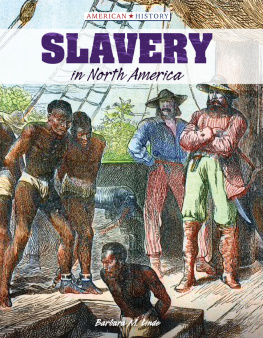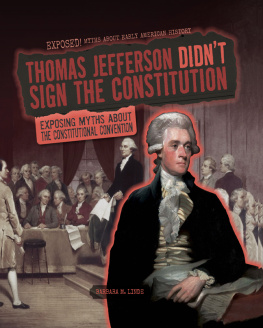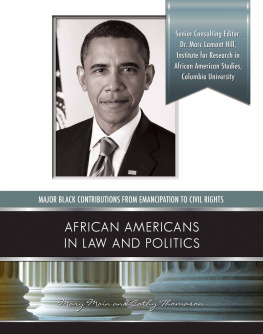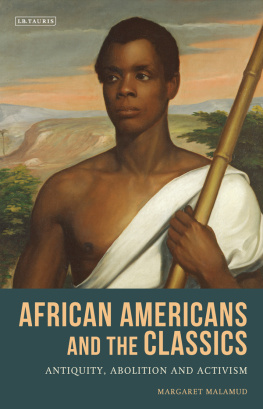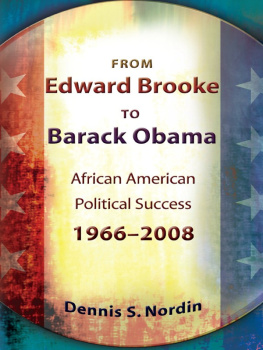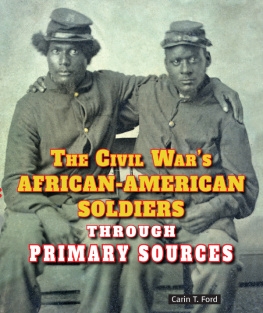Published in 2018 by
Lucent Press, an Imprint of Greenhaven Publishing, LLC
353 3rd Avenue
Suite 255
New York, NY 10010
Copyright 2018 Greenhaven Press, a part of Gale, Cengage Learning
Gale and Greenhaven Press are registered trademarks used herein under license.
All new materials copyright 2018 Lucent Press, an Imprint of Greenhaven Publishing, LLC.
All rights reserved. No part of this book may be reproduced in any form without permission in writing from the publisher, except by a reviewer.
Designer: Deanna Paternostro
Editor: Siyavush Saidian
Library of Congress Cataloging-in-Publication Data
Names: Linde, Barbara M.
Title: African Americans in political office: from the Civil War to the White House / Barbara M. Linde.
Description: New York : Lucent Press, 2018. | Series: Lucent library of black history | Includes index.
Identifiers: ISBN 9781534560758 (library bound) | ISBN 9781534560765 (ebook)
Subjects: LCSH: African Americans--Politics and government--Juvenile literature. | African Americans-History--Juvenile literature.
Classification: LCC E185.6 L56 2018 | DDC 973.0496073--dc23
Printed in the United States of America
CPSIA compliance information: Batch #BS17KL: For further information contact Greenhaven Publishing LLC, New York, New York at 1-844-317-7404.
Please visit our website, www.greenhavenpublishing.com. For a free color catalog of all our high-quality books, call toll free 1-844-317-7404 or fax 1-844-317-7405.
CONTENTS
Foreword
Setting the Scene: A Timeline
Introduction:
From Enslavement to the Presidency
Chapter One:
A New Political Life for African Americans
Chapter Two:
Political Power is Lost and Regained
Chapter Three:
African Americans in Local Government
Chapter Four:
Black Politicians in States and Territories
Chapter Five:
The White House and Capitol Hill
Chapter Six:
High-Profile Appointments
Chapter Seven:
Progress in Spite of Racism
Notes
For More Information
Index
Picture Credits
About the Author
FOREWORD
B lack men and women in the United States have become successful in every field, but they have faced incredible challenges while striving for that success. They have overcome racial barriers, violent prejudice, and hostility on every side, all while continuing to advance technology, literature, the arts, and much more.
From medicine and law to sports and literature, African Americans have come to excel in every industry. However, the story of African Americans has often been one of prejudice and persecution. More than 300 years ago, Africans were taken in chains from their home and enslaved to work for the earliest American settlers. They suffered for more than two centuries under the brutal oppression of their owners, until the outbreak of the American Civil War in 1861. After the dust settled four years later and thousands of Americansboth black and whitehad died in combat, slavery in the United States had been legally abolished. By the turn of the 20th century, with the help of the 13th, 14th, and 15th Amendments to the U.S. Constitution, African American men had finally won significant battles for the basic rights of citizenship. Then, with the passage of the groundbreaking Civil Rights Act of 1964, many people of all races began to believe that America was finally ready to start moving toward a more equal future.
These triumphs of human equality were achieved with help from brave social activists such as Frederick Douglass, Martin Luther King Jr., and Maya Angelou. They all experienced racial prejudice in their lifetimes and fought by writing, speaking, and peacefully acting against it. By exposing the suffering of the black community, they brought the United States together to try and remedy centuries worth of wrongdoing. Today, it is important to learn about the history of African Americans and their experiences in modern America in order to work toward healing the divide that still exists in the United States. This series aims to give readers a deeper appreciation for and understanding of a part of the American story that is often left untold.
Even before the legal emancipation of slaves, black culture was thriving despite many attempts to suppress it. From the 1600s to 1800s, slaves developed their own cultural perspective. From music, to language, to art, slaves began cultivating an identity that was completely unique. Soon after these slaves were granted citizenship and were integrated into American society, African American culture burst into the mainstream. New generations of authors, scholars, painters, and singers were born, and they spread an appreciation for black culture across America and the entire world. Studying the contributions of these talented individuals fosters a sense of optimism. Despite the cruel treatment and racist attitudes they faced, these men and women never gave up, changing the world with their determination and unique voice. Discovering the triumphs and tragedies of the oppressed allows readers to gain a clearer picture of American history and American cultural identity.
Here to help young readers with this discovery, this series offers a glimpse into the lives and accomplishments of some of the most important and influential African Americans across historical time periods. Titles examine primary source documents and quotes from contemporary thinkers and observers to provide a full and nuanced learning experience for readers. With thoroughly researched text, unique sidebars, and a carefully selected bibliography for further research, this series is an invaluable resource for young scholars. Moreover, it does not shy away from reconciling the brutality of the past with a sense of hopefulness for the future. This series provides critical tools for understanding more about how black history is a vital part of American history.
SETTING THE SCENE: A TIMELINE
INTRODUCTION
FROM ENSLAVEMENT TO THE PRESIDENCY
O n July 27, 2004, four years before he was elected to be the first African American president in United States history, Barack Obama delivered the keynote address of the Democratic National Convention in Boston, Massachusetts. In a stirring speech to delegates and a national television audience of tens of millions of viewers, Obama explained that any greatness the United States had achieved was due to the guarantees of equality and liberty its founders made to all citizens in the Declaration of Independence. Obama said,
We hold these truths to be selfevident, that all men are created equal. That they are endowed by their Creator with certain inalienable rights. That among these are life, liberty and the pursuit of happiness. That is the true genius of America, a faith in the simple dreams of its people, the insistence on small miracles.
He stated that these powerful promises, issued on July 4, 1776, had enabled him and millions of other African Americans and people of all races to achieve great things despite the color of their skin. Obama claimed, I stand here knowing that my story is part of the larger American story [and] that, in no other country on earth, is my story even possible.



